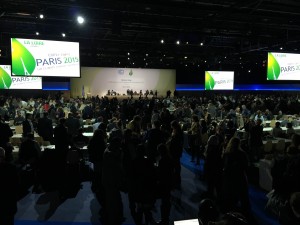by Sergio Cahueque and Sara Velander
The Ad Hoc Working Group on the Durban Platform for Enhanced Action (ADP) opening session took place on Sunday, November 29th at 5 PM, starting with a minute of silence to honor all the victims of the terrorist attacks in Paris two weeks ago. The purpose of the ADP in the next week is to consolidate a document that the parties can adopt, as a protocol or other legal instrument, under the United Nations Framework Convention on Climate Change.
The brief one-hour opening session of the ADP, facilitated by the ADP co-chairs Ahmed Djoghlaf from Algeria and Daniel Reifsnyder from the US, comprised of several welcoming remarks from the COP20 and COP21 presidents. The president of COP20, Manuel Pulgar-Vidal, emphasized that this ADP session should finish with an agreement and that will require radical change in modes of work in order for the ADP to succeed in the objectives laid out in Durban three years ago. In order to be effective in these negotiations, the COP20 president highlighted the need to follow text-specific, solutions-oriented engagement among the parties. Parties will need to apply inclusiveness and transparency to the party-driven process so that a “balanced and concise agreement” will be reached by the end of the first week.

The COP21 president, Laurent Fabius reiterated Manuel’s remarks on the “political impetus” for decisive negotiations that will conclude on December 11th and kickstart an ambitious, legally-binding program on the climate. The agreement should give the world a means of reducing greenhouse gas emissions and keep the global warming under 2C or 1.5C in order to face the adverse impacts of climate change. Fabius emphasized the need for transparency and acknowledged the role of civil society observers at the negotiations. He supports the co-chairs’ request for the text to have the fewest options as possible in the final text on Saturday, December 5, in order to effectively move forward with the conference. The COP21 president is confident that there will be a successful result only if the agreement represents all countries’ topics and if the text centers around solutions. Fabius stressed the time constraint for the ADP negotiators to reach an agreement and that the secretariat wants the agreements to be finalised mid-week in the second week, meaning there won’t be time to decide on all 50 pending issues present in the text currently. The COP21 president ended his introductory remarks exclaiming that “my door will always be open to you [the negotiators]” and at 6 PM on Saturday, December 11, the COP will adopt ambitious agreement that excludes no party and continues this journey that began in Rio, stopped in Kyoto, and lead to Paris.
In order to achieve a concise outcome by the end of this week in a timely manner, the ADP Co-Chair Daniel Reifsnyder proposed a mode of work that consisted of four main points:
- The proposal of an open ended contact group to open on Tuesday at 10 AM and to convene daily;
- Spin-off groups that will convene starting Monday, November 30 from 7-9 PM, to discuss issues on technology transfer and capacity building, implementation and compliance, workstream 2 and, “at request of parties and after extensive consultation”, a discussion on the preamble 2bis and article 2;
- Consultation groups that will meet at 10 AM to discuss mitigation, adaptation and loss and damage, finance, transparency of action and support; and
- The introduction of two open ended contact groups that will discuss global stocktakings and definitions on Article 1.
After explaining the mode of work, Reifsnyder introduced the deadlines that will keep the work of the parties on time. The open ended contact group and the spin-off groups will conclude on December 3rd at 9 PM. A consolidated revised version of the text, that records the progress made by individual groups, will be prepared and made available at 8 AM in the morning of December 4th. Then, from December 4th to December 5th, parties will further develop the draft Paris agreement and finalize it before Saturday, December 5th. The closing plenary of the ADP will take place that same Saturday at noon and the finalized draft agreement will be sent to the COP for further consideration.
Despite making remarks on the importance of inclusiveness and transparency during the process, the interventions of two countries showed that what there is some discrepancy between what Co-chairs say and what actually happens at the negotiations. Venezuela raised a point of order concern on the inability of their delegation to pass through the plenary room entrance, putting them on a position of disadvantage compared to other delegations as they were incomplete. Tuvalu raised concerns on the lack of transparency as their delegation was unaware of the informal meetings that were already taking place.
The opening plenary set the stage for what is going to be a long, arduous week of work for the ADP negotiators as the world awaits for a new agreement to be adopted. However, the weight that the co-chairs and COP presidencies place on the ambition of this agreement through the establishment of rapid deadlines could mean that several crucial elements, particular to developing countries, will be excluded in the final agreement. Although it is important to have an outcome two weeks from now, there should be a stronger push towards an equitable and ambitious agreement that represents the views of those countries that are already facing adverse impacts of climate change and are least responsible.